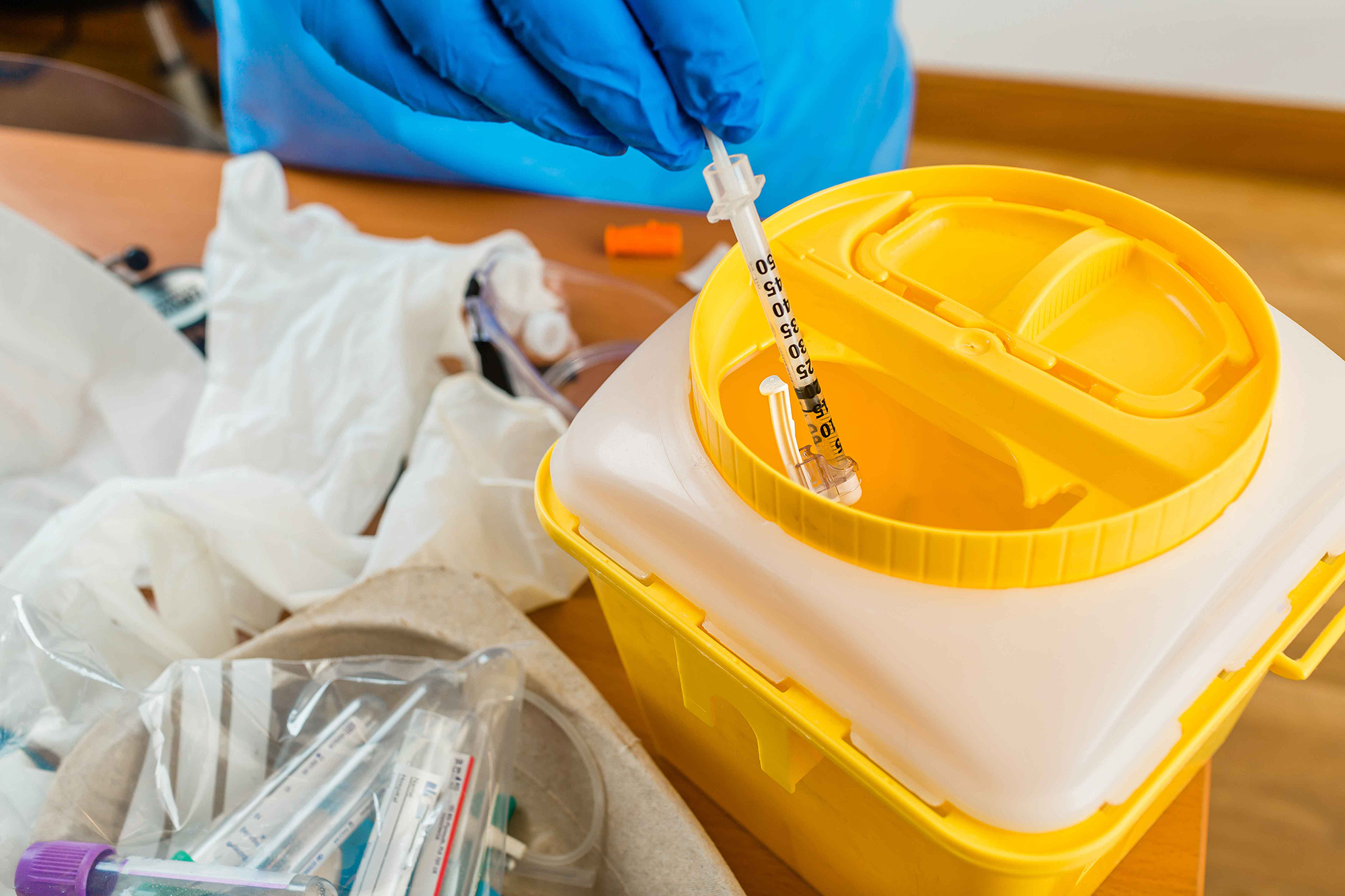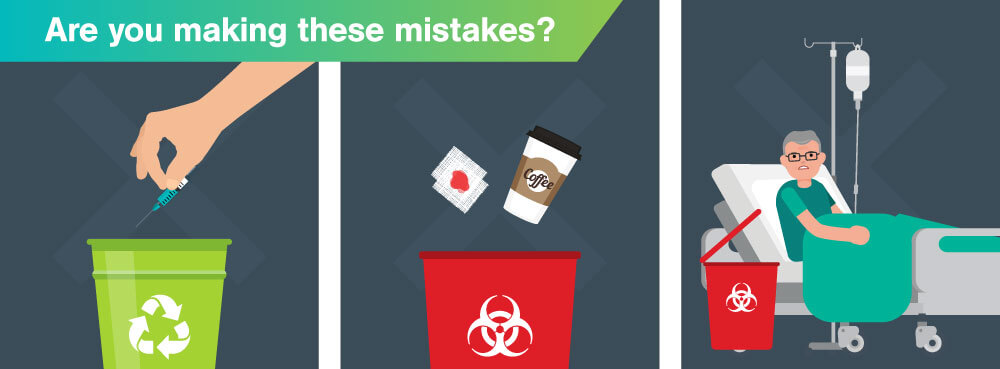Guaranteeing Safe Handling and Disposal of Medical Waste
Making sure secure handling and disposal of medical waste is of vital importance in health care settings. Inappropriate management of medical waste can posture substantial threats to the setting, public health and wellness, and health care employees. This necessitates adherence to stringent standards and protocols for its safe handling and disposal. In this introduction, we will check out the relevance of appropriate medical waste administration, the dangers related to incorrect handling and disposal, in addition to the guidelines and methods that can be carried out to ensure its risk-free disposal. Additionally, we will discuss the significance of training and education for health care specialists in order to keep a secure and tidy health care setting. By complying with these techniques, we can successfully alleviate the potential threats connected with medical waste.
Relevance of Appropriate Medical Waste Management
Correct clinical waste monitoring is of utmost relevance in guaranteeing the safety and health of health care professionals, individuals, and the general public. Medical waste describes any type of waste generated by healthcare centers during the diagnosis, treatment, or immunization of people or pets. This waste can pose serious wellness dangers if not handled and disposed of correctly.
Among the main reasons proper medical waste monitoring is important is to stop the spread of infectious diseases. Clinical waste, such as used needles, infected dressings, and organic materials, can lug hazardous virus. If not dealt with and disposed of correctly, these pathogens can be sent to healthcare employees, people, waste trainers, and also the basic public, causing the prospective break out of diseases.
Furthermore, correct clinical waste monitoring assists protect the setting - medical waste disposal. Medical waste contains unsafe products, including chemicals, drugs, and radioactive substances. When not taken care of properly, these materials can infect soil, water bodies, and the air, presenting a substantial hazard to environments and public health
In addition, efficient medical waste monitoring ensures compliance with international criteria and regional regulations. Federal governments and regulatory bodies have actually developed methods and standards to make sure the risk-free handling, storage space, transportation, and disposal of medical waste. Sticking to these regulations is necessary to prevent legal repercussions and keep the track record and trustworthiness of healthcare centers.
Threats of Improper Handling and Disposal

People can likewise be subjected to these contagious conditions if clinical waste is not appropriately gotten rid of. If polluted needles or various other sharps are not disposed of in assigned puncture-proof containers, they might accidentally prick clients, leading to prospective infections. Additionally, if clinical waste is not segregated properly, there is a risk of cross-contamination between various kinds of waste, additional raising the possibilities of condition transmission.
Incorrect disposal of medical waste can also have destructive impacts on the environment and the basic public. If clinical waste is not dealt with and disposed of appropriately, it can infect water sources, dirt, and air, leading to the spread of contaminants and conditions. This can have long-lasting consequences on communities and public health and wellness.
Standards for Safe Handling of Medical Waste
Carrying out effective methods for the risk-free handling of clinical waste is important in making certain the security of medical care specialists, clients, and the basic public. These standards are crucial in decreasing the threats related to the handling and disposal of medical waste, such as infections, injuries, and environmental pollution.
Primarily, medical care centers need to establish an extensive waste management plan that sticks to regional, nationwide, and worldwide policies. This plan must consist of clear instructions on waste partition, product packaging, transportation, labeling, and storage space. It is essential to divide various kinds of waste, such as sharps, contagious products, drugs, and non-hazardous waste, to avoid cross-contamination and promote safe disposal.
Furthermore, health care employees need to get thorough training on correct waste handling techniques. They should be educated on the potential dangers of medical waste, the proper use of personal protective tools (PPE), and the appropriate treatments for handling, transporting, and throwing away various sorts of waste.
Moreover, health care facilities must on a regular basis monitor and investigate their waste administration practices to make sure compliance with guidelines. This consists of carrying out routine evaluations, assessing waste handling treatments, and providing comments and training to team member.
Efficient Techniques for Garbage Disposal
To make sure the risk-free handling and disposal of clinical waste, it is necessary to employ efficient strategies for garbage disposal. Medical waste can present significant risks to public health and wellness and the atmosphere otherwise managed and disposed of correctly. Health care facilities and waste management companies should carry out ideal methods to alleviate these threats.
It includes separating various types of clinical waste based on their characteristics. Medical care facilities need to supply clear guidelines and training to personnel members on how to set apart waste properly.

In addition, medical care facilities ought to work together with certified waste monitoring business to make certain proper disposal of medical waste. These business have the experience and equipment called for to safely take care of and dispose of clinical waste in conformity with regulations and best techniques.
Training and Education for Medical Care Professionals
Healthcare experts play a crucial function in ensuring the safe handling and disposal of medical waste via detailed training and education. It is vital for doctor to have a deep understanding of the potential risks related to medical waste and the correct methods for its administration. By receiving appropriate training, medical care specialists can reduce the possible transmission of contagious illness, protect against ecological contamination, and secure both themselves and the public.

Additionally, training programs ought to emphasize the use of individual protective devices (PPE) and appropriate hand hygiene techniques when managing medical waste. medical waste removal. Healthcare specialists need to understand just how to properly dispose and utilize of PPE to protect themselves from prospective exposure to unsafe products. They should also be informed on the value of regular handwashing and the proper use hand sanitizers to lessen the spread of contagious illness
Continuing education and learning and routine updates on clinical waste monitoring methods are essential for medical care professionals. As standards and policies advance, it is vital to maintain health care providers educated concerning any type of modifications in methods and ideal methods. This will certainly make certain that they stay current and keep a high requirement of safety in dealing with and disposing of medical waste.
Conclusion
To conclude, appropriate handling and disposal of clinical waste is vital to ensure the safety of health care experts, people, and the environment. Neglecting to comply with policies and standards can cause numerous threats and risks. Executing efficient approaches for waste disposal and offering appropriate training and education and learning for medical care professionals are essential in maintaining a risk-free medical care environment. By sticking to these methods, we can alleviate the potential threats connected with clinical waste.
Medical waste refers to any type of waste generated about his by healthcare facilities throughout the diagnosis, therapy, or immunization of people or animals. If clinical waste is not segregated effectively, there is a threat of cross-contamination between different kinds of waste, additional boosting the chances of condition transmission.
It is important to divide different types of waste, such as sharps, infectious products, drugs, and non-hazardous waste, to protect against cross-contamination and promote safe disposal. WasteX Medical Waste Disposal.
To guarantee the risk-free handling and disposal of clinical waste, it is essential to employ efficient strategies for waste disposal. In addition, healthcare centers should establish a regular waste collection and transportation routine to stop waste build-up and lessen the risk of crashes or contamination.